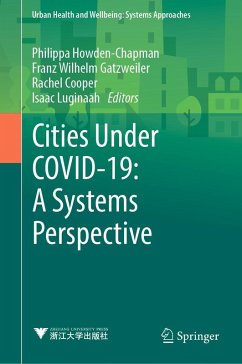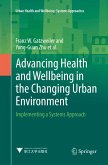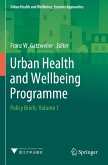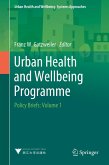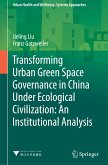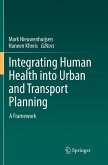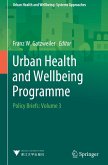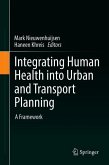Cities Under COVID-19: A Systems Perspective
Herausgegeben:Howden-Chapman, Philippa; Wilhelm Gatzweiler, Franz; Cooper, Rachel; Luginaah, Isaac
Cities Under COVID-19: A Systems Perspective
Herausgegeben:Howden-Chapman, Philippa; Wilhelm Gatzweiler, Franz; Cooper, Rachel; Luginaah, Isaac
- Gebundenes Buch
- Merkliste
- Auf die Merkliste
- Bewerten Bewerten
- Teilen
- Produkt teilen
- Produkterinnerung
- Produkterinnerung
The 15 international authors of this book live in Brazil, Canada, Cameroon, China, Cuba, European Union, Finland, Gaza Strip, India, Nepal, New Zealand, Nigeria, Sri Lanka, United Kingdom and the United States of America. The authors are linked to the International Science Council's Urban Health and Wellbeing Programme.
In this book the authors analyse the management of COVID-19, which started in late 2019, in their cities. They explain their city's political, social and economic context, the dynamics of how the pandemic unfolded, drawing on quantitative and visual data, and their…mehr
Andere Kunden interessierten sich auch für
![Advancing Health and Wellbeing in the Changing Urban Environment Advancing Health and Wellbeing in the Changing Urban Environment]() Franz W GatzweilerAdvancing Health and Wellbeing in the Changing Urban Environment75,99 €
Franz W GatzweilerAdvancing Health and Wellbeing in the Changing Urban Environment75,99 €![Urban Health and Wellbeing Programme Urban Health and Wellbeing Programme]() Urban Health and Wellbeing Programme64,99 €
Urban Health and Wellbeing Programme64,99 €![Urban Health and Wellbeing Programme Urban Health and Wellbeing Programme]() Urban Health and Wellbeing Programme75,99 €
Urban Health and Wellbeing Programme75,99 €![Transforming Urban Green Space Governance in China Under Ecological Civilization: An Institutional Analysis Transforming Urban Green Space Governance in China Under Ecological Civilization: An Institutional Analysis]() Jieling LiuTransforming Urban Green Space Governance in China Under Ecological Civilization: An Institutional Analysis97,99 €
Jieling LiuTransforming Urban Green Space Governance in China Under Ecological Civilization: An Institutional Analysis97,99 €![Integrating Human Health into Urban and Transport Planning Integrating Human Health into Urban and Transport Planning]() Integrating Human Health into Urban and Transport Planning165,99 €
Integrating Human Health into Urban and Transport Planning165,99 €![Urban Health and Wellbeing Programme Urban Health and Wellbeing Programme]() Urban Health and Wellbeing Programme75,99 €
Urban Health and Wellbeing Programme75,99 €![Integrating Human Health into Urban and Transport Planning Integrating Human Health into Urban and Transport Planning]() Integrating Human Health into Urban and Transport Planning165,99 €
Integrating Human Health into Urban and Transport Planning165,99 €-
-
-
The 15 international authors of this book live in Brazil, Canada, Cameroon, China, Cuba, European Union, Finland, Gaza Strip, India, Nepal, New Zealand, Nigeria, Sri Lanka, United Kingdom and the United States of America. The authors are linked to the International Science Council's Urban Health and Wellbeing Programme.
In this book the authors analyse the management of COVID-19, which started in late 2019, in their cities. They explain their city's political, social and economic context, the dynamics of how the pandemic unfolded, drawing on quantitative and visual data, and their reflections on how it was managed. The book concludes with an analysis of the similarities and differences among COVID-19 outcomes in these cities. Using a systems perspective to learn from these experiences can help all cities to improve the governance of pandemics and be better prepared for likely future ones.
In this book the authors analyse the management of COVID-19, which started in late 2019, in their cities. They explain their city's political, social and economic context, the dynamics of how the pandemic unfolded, drawing on quantitative and visual data, and their reflections on how it was managed. The book concludes with an analysis of the similarities and differences among COVID-19 outcomes in these cities. Using a systems perspective to learn from these experiences can help all cities to improve the governance of pandemics and be better prepared for likely future ones.
Produktdetails
- Produktdetails
- Urban Health and Wellbeing
- Verlag: Springer / Springer Nature Singapore / Springer, Berlin / Zhejiang University Press
- Artikelnr. des Verlages: 978-981-19-8162-3
- 2023
- Seitenzahl: 292
- Erscheinungstermin: 1. September 2023
- Englisch
- Abmessung: 241mm x 160mm x 22mm
- Gewicht: 606g
- ISBN-13: 9789811981623
- ISBN-10: 9811981620
- Artikelnr.: 66105186
- Herstellerkennzeichnung Die Herstellerinformationen sind derzeit nicht verfügbar.
- Urban Health and Wellbeing
- Verlag: Springer / Springer Nature Singapore / Springer, Berlin / Zhejiang University Press
- Artikelnr. des Verlages: 978-981-19-8162-3
- 2023
- Seitenzahl: 292
- Erscheinungstermin: 1. September 2023
- Englisch
- Abmessung: 241mm x 160mm x 22mm
- Gewicht: 606g
- ISBN-13: 9789811981623
- ISBN-10: 9811981620
- Artikelnr.: 66105186
- Herstellerkennzeichnung Die Herstellerinformationen sind derzeit nicht verfügbar.
Philippa Howden-Chapman, a sesquicentennial distinguished professor of public health at the University of Otago, Wellington, New Zealand, is a co-director of He K¿inga Oranga/ Housing and Health Research Programme and the director of the NZ Centre for Sustainable Cities. She conducts randomized community housing trials in partnership with local communities, which have had a major influence on housing, urban policy and health. Her work focuses on reducing inequalities in the determinants of health and wellbeing. She is a director on the board of the Crown Entity K¿inga Ora-homes and communities, a fellow of the Royal Society of NZ and a chair of the International Science Council Committee, Urban Health and Wellbeing: a systems approach. She has received numerous awards, including the Prime Minister's Science Team Prize and the Royal Society of NZ Rutherford Medal. She was awarded a Queen's Service Order and a Companion of the NZ Order of Merit for contributions to public health. Franz Wilhelm Gatzweiler is a professor at the Institute of Urban Environment, Chinese Academy of Sciences, and the executive director of the International Science Council's global interdisciplinary science programme on 'Urban Health and Wellbeing: a Systems Approach'. He studied agricultural and institutional economics at the University of Bonn and the Humboldt University of Berlin in Germany. His research focus was on the 'Economic Value of Nature and the Nature of Economic Value'. He has been a coordinating chapter lead author for UNEP's report on the Economics of Ecosystems and Biodiversity and recently UNDRR's next Global Assessment Report on Governance of Systemic Risks. He is a senior fellow at the Centre for Development Research, University of Bonn, and an external affiliated faculty of the Ostrom Workshop, Indiana University. He received his habilitation from Humboldt University in the field of resource economics. His current research interests focus on the governance of complex systems and systemic risks. Rachel Cooper is a distinguished professor of Design Management and Policy at Lancaster University. She is a founding director of ImaginationLancaster, an open and exploratory design-led research centre conducting applied and theoretical research into people, products, places and their interactions. Her research interests cover: design thinking; design management; design policy; and across all sectors of industry, a specific interest in design for wellbeing and socially responsible design. She was a lead expert for the UK Government Foresight programme on the Future of Cities (2013-2016), was on the UK Academy of Medical Sciences Working group addressing 'The Health of the Public 2040' (2015-16) and is a chair of the UK Prevention Research Partnership, Scientific Advisory Board. She is currently a president of the Design Research Society. Isaac Luginaah is a distinguished university professor in the Department of Geography and Environment, Western University. He was a Canada research chair in Health/Medical Geography (2007-2017). Dr. Luginaah exhibits high standards of excellence and disciplinary engagement that makes him an internationally renowned, prize winning researcher and teacher, whose work has been highly recognized. He is a member of the International Science Council Scientific Committee on Urban Health and Wellbeing. His contributions to the fields of environment and health have been recognized with several prizes and awards including from the Royal Society of Canada (College Member), Fellow of the African Academy of Sciences.
Introduction.- COVID-19 in São Paulo.- Epidemiological insights, public health response and potential psycho-socio-economic impacts of COVID-19 pandemic in Douala: a population-based study.- Examining the response to the COVID-19 Pandemic in the City of London and Middlesex County using a Systems Approach: What lessons can we learn?.- Urban factors influencing COVID-19 incidence under central-local interaction.- COVID-19 in Havana, Cuba 2020.- Social and Industrial Clusters to support European cities under COVID-19: The impact of the European Alliance on Coronavirus actions.- How bright are the northern lights? Finnish welfare state and local responses to COVID-19.- Coping Strategies, Response and Sustainable Future to Covid-19 in the capital of India, Delhi.- COVID-19 response of Biratnagar Metropolitan City - the second largest city in Nepal.- Aotearoa New Zealand cities under Covid-19: a systems perspective.- Coping with COVID-19 in Two Urban Communities in Ibadan Metropolis, Nigeria.- Non-State actors and COVID-19: Hamas as a Case study.- A case study of Colombo, Sri Lanka.- A case study of Lancaster, UK.- New York City and COVID-19.- Conclusions.
Introduction.- COVID-19 in São Paulo.- Epidemiological insights, public health response and potential psycho-socio-economic impacts of COVID-19 pandemic in Douala: a population-based study.- Examining the response to the COVID-19 Pandemic in the City of London and Middlesex County using a Systems Approach: What lessons can we learn?.- Urban factors influencing COVID-19 incidence under central-local interaction.- COVID-19 in Havana, Cuba 2020.- Social and Industrial Clusters to support European cities under COVID-19: The impact of the European Alliance on Coronavirus actions.- How bright are the northern lights? Finnish welfare state and local responses to COVID-19.- Coping Strategies, Response and Sustainable Future to Covid-19 in the capital of India, Delhi.- COVID-19 response of Biratnagar Metropolitan City - the second largest city in Nepal.- Aotearoa New Zealand cities under Covid-19: a systems perspective.- Coping with COVID-19 in Two Urban Communities in Ibadan Metropolis, Nigeria.- Non-State actors and COVID-19: Hamas as a Case study.- A case study of Colombo, Sri Lanka.- A case study of Lancaster, UK.- New York City and COVID-19.- Conclusions.

